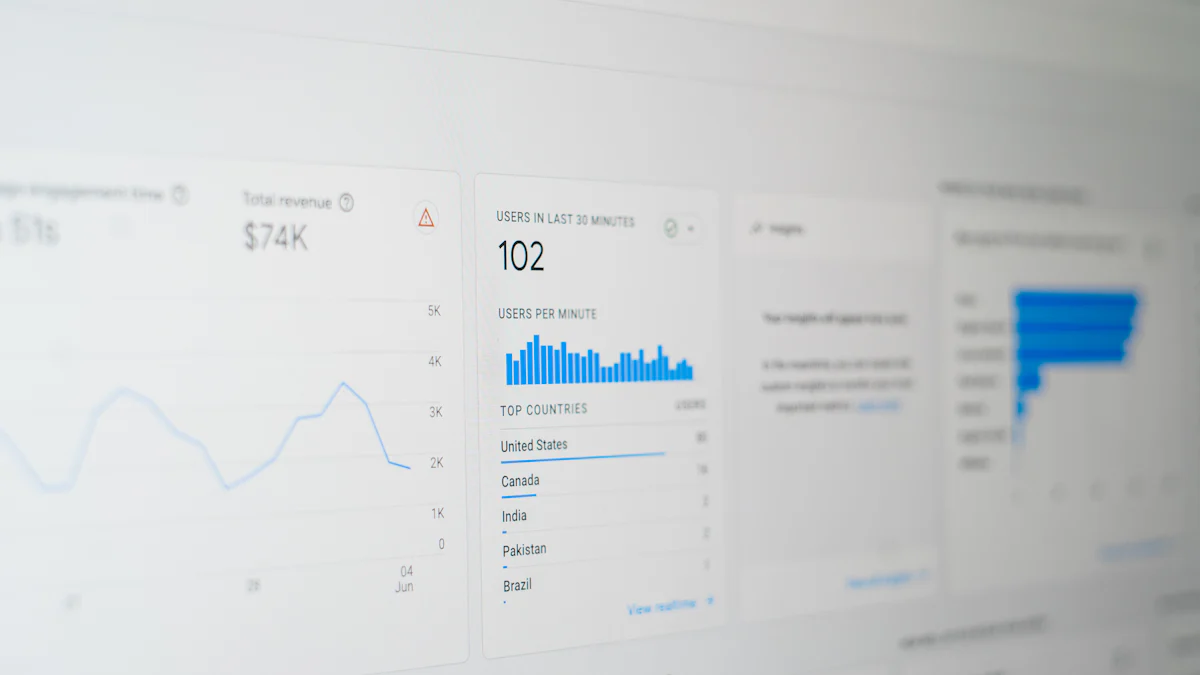


Cloud BI transforms data into actionable insights within a cloud environment. It empowers you to make data-driven decisions without the need for physical hardware. This approach enables seamless access to insights from anywhere, fostering collaboration and efficiency. As businesses face complex and diverse data, Cloud BI becomes critical. In fact, 54% of firms consider it essential for their objectives. The market for cloud-based BI is rapidly expanding, shaping the future of data collection and usage. By adopting Cloud BI, you can reduce costs and maintain scalability, creating a truly data-driven organization.
Understanding Cloud BI
Definition and Explanation of Cloud BI
Cloud BI transforms your data into actionable insights within a cloud environment. It connects various data sources, such as customer information and sales data, to identify meaningful patterns. This approach empowers you to make informed decisions quickly and easily.
Key Characteristics of Cloud BI
Cloud BI offers several key features:
- Scalability and Flexibility: You can adjust to business needs without investing in new hardware.
- Collaborative Knowledge Sharing: Teams can share insights seamlessly, enhancing collaboration.
- High-Performance Computing: Access powerful computing resources to analyze data efficiently.
- Built-in Data Connectors: Integrate with other databases and cloud services effortlessly.
How Cloud BI Differs from Traditional BI
Traditional BI often relies on on-premises infrastructure, which can be costly and inflexible. In contrast, Cloud BI eliminates the need for physical hardware, offering a subscription-based model. This allows you to access and analyze data from anywhere, fostering a more agile and responsive business environment.
Evolution of Cloud BI
Historical Context
Cloud BI has evolved significantly over the years. Initially, businesses relied on traditional BI systems that required substantial investments in infrastructure. As cloud technology advanced, organizations began to see the benefits of moving their BI processes to the cloud.
Technological Advancements Enabling Cloud BI
Several technological advancements have driven the growth of Cloud BI:
- Data Connectivity Mandates: These mandates have fueled the global cloud analytics market, projected to reach over $86 billion by 2028.
- AI and Machine Learning: These technologies enhance the accuracy of analyses and expand functionality, shaping the future of data collection and usage.
By embracing Cloud BI, you can create a truly data-driven organization, accessing insights quickly and efficiently.
Benefits of Cloud BI

Cloud BI offers numerous advantages that can transform how you manage and analyze data. By leveraging the power of the cloud, you can achieve cost efficiency, scalability, flexibility, and enhanced accessibility and collaboration.
Cost Efficiency
Cloud BI significantly reduces costs associated with traditional business intelligence systems.
Reduction in Infrastructure Costs
You no longer need to invest in expensive hardware or maintain complex IT infrastructure. Cloud BI eliminates these costs, allowing you to allocate resources more effectively. This approach not only saves money but also reduces the burden on your IT team.
Pay-as-you-go Pricing Models
With Cloud BI, you benefit from a pay-as-you-go pricing model. This means you only pay for the resources you use, avoiding large upfront investments. This flexibility allows you to scale your BI capabilities according to your business needs without financial strain.
Cloud BI provides unparalleled scalability and flexibility, adapting to your business's growth and changing requirements.
Adapting to Business Growth
As your business expands, Cloud BI scales effortlessly. You can increase or decrease your data processing capabilities without the need for additional hardware. This adaptability ensures that your BI system grows with your organization.
Customization Options
Cloud BI offers a range of customization options to suit your specific needs. You can tailor the system to fit your business processes, ensuring that you get the most relevant insights. This level of customization enhances the value of your BI efforts.
Accessibility and Collaboration
Cloud BI enhances accessibility and collaboration, enabling your team to work more efficiently.
Remote Access Capabilities
With Cloud BI, you can access data and insights from anywhere, at any time. This remote access capability supports a flexible work environment, allowing your team to make informed decisions even when they are not in the office.
Enhanced Team Collaboration
Cloud BI fosters enhanced team collaboration by providing a centralized platform for data sharing. Your team can easily share insights and collaborate on projects, leading to more cohesive and informed decision-making processes.
By embracing Cloud BI, you unlock these benefits, positioning your organization for success in a data-driven world.
Use Cases of Cloud BI
Cloud BI offers versatile applications Cloud BI offers versatile applications across various industries and business functions. By leveraging its capabilities, you can transform data into actionable insights tailored to your specific needs.
Industry-Specific Applications
Retail and E-commerce
In retail and e-commerce, Cloud BI helps you understand customer behavior and optimize inventory management. You can analyze sales patterns, track customer preferences, and adjust marketing strategies. This insight allows you to enhance customer satisfaction and increase sales.
Healthcare and Pharmaceuticals
For healthcare and pharmaceuticals, Cloud BI provides critical insights into patient care and drug development. You can monitor patient outcomes, streamline operations, and ensure compliance with regulations. This data-driven approach improves patient care and accelerates research and development.
Business Functions
Marketing and Sales Analytics
Cloud BI empowers your marketing and sales teams with real-time analytics. You can track campaign performance, identify trends, and refine strategies. This enables you to target the right audience and boost conversion rates effectively.
Financial Reporting and Analysis
In financial reporting, Cloud BI offers precise and timely insights. You can automate reporting processes, analyze financial data, and make informed decisions. This enhances transparency and supports strategic planning, ensuring financial stability.
By integrating Cloud BI into your operations, you unlock valuable insights that drive growth and efficiency. Its adaptability across industries and functions makes it an essential tool for modern businesses.
Comparing Cloud BI with Traditional BI

Deployment and Maintenance
On-premises vs. Cloud-based Solutions
When you compare Cloud BI with traditional BI, deployment stands out as a major difference. Traditional BI requires on-premises infrastructure. This setup demands significant upfront investments in hardware and software. You must also allocate resources for ongoing maintenance. In contrast, Cloud BI operates in the cloud. It eliminates the need for physical infrastructure. You can access it through a subscription-based model. This approach reduces initial costs and provides flexibility. You can scale your BI capabilities as your business grows without investing in new hardware.
Maintenance and Updates
Maintenance and updates present another area where Cloud BI excels. Traditional BI systems require internal teams to manage updates and maintenance. This process can be time-consuming and costly. Cloud BI, however, offers managed maintenance and updates. The service provider handles these tasks. You benefit from the latest features and security enhancements without additional effort. This managed approach frees up your IT team to focus on strategic initiatives.
Data Security and Compliance
Security Measures in Cloud BI
Data security remains a top priority for any BI solution. Cloud BI platforms implement robust security measures to protect your data. These measures include encryption, multi-factor authentication, and regular security audits. By leveraging these advanced security protocols, you can ensure that your data remains safe from unauthorized access. Cloud BI providers also offer real-time monitoring and threat detection. This proactive approach enhances your data security posture.
Compliance with Industry Standards
Compliance with industry standards is crucial for businesses across sectors. Cloud BI solutions adhere to strict compliance requirements. They align with standards such as GDPR, HIPAA, and ISO certifications. By choosing a Cloud BI platform, you can ensure that your data practices meet regulatory requirements. This compliance not only protects your organization from legal risks but also builds trust with your customers.
Cloud BI offers numerous advantages over traditional BI. Its cloud-based deployment, managed maintenance, and robust security measures make it an attractive choice for modern businesses. By adopting Cloud BI, you can enhance operational efficiency, reduce costs, and ensure data security and compliance.
Challenges and Limitations of Cloud BI
Data Privacy Concerns
Handling Sensitive Information
When you use Cloud BI, handling sensitive information becomes a critical concern. You must ensure that your data remains secure and private. Implementing robust security measures like encryption and multi-factor authentication is essential. These tools help protect your data from unauthorized access. For example, the ISO 27001 Standard provides a framework for managing information security, ensuring that your data handling practices meet stringent requirements.
Regulatory Compliance Challenges
Navigating regulatory compliance is another challenge with Cloud BI. You need to adhere to various laws and regulations that govern data privacy. In the United States, the California Consumer Privacy Act (CCPA) enhances consumer data privacy rights. It requires businesses to implement specific privacy policies and security measures. Similarly, the General Data Protection Regulation (GDPR) in the European Union imposes strict requirements on data controllers and processors. Compliance with these regulations ensures that you protect personal data and avoid legal penalties.
Integration with Existing Systems
Compatibility Issues
Integrating Cloud BI with your existing systems can present compatibility issues. You may face challenges in aligning new cloud-based solutions with your current infrastructure. Ensuring seamless integration requires careful planning and evaluation of your systems. You need to assess whether your existing software and hardware can support Cloud BI tools. This evaluation helps you identify potential obstacles and develop strategies to overcome them.
Data Migration Challenges
Data migration is another hurdle when implementing Cloud BI. Moving data from on-premises systems to the cloud can be complex. You must ensure data consistency and integrity during the migration process. Developing a clear migration strategy is crucial. This strategy should include steps for data validation and testing to prevent data loss or corruption. By addressing these challenges, you can successfully transition to a cloud-based environment and leverage the full potential of Cloud BI.
Implementing Cloud BI Solutions
Evaluating Cloud BI Providers
Choosing the right Cloud BI provider is crucial for your success. Here’s how you can evaluate them effectively:
Key Criteria for Selection
- Scalability: Ensure the provider can grow with your business needs.
- Security: Look for robust security measures like encryption and multi-factor authentication.
- User-Friendly Interface: A simple interface helps your team use the tools efficiently.
- Integration Capabilities: Check if the provider supports seamless integration with your existing systems.
Vendor Reputation and Support
- Reputation: Research the provider’s track record and customer reviews.
- Support: Evaluate the quality of customer support. Reliable support ensures smooth operations and quick resolution of issues.
Expert Testimony: A team of highly skilled experts, including data engineers and Cloud DevOps professionals, is essential for implementing BI on the cloud.
Integration Strategies
Integrating Cloud BI with your current systems requires careful planning. Here’s how you can achieve a seamless transition:
Seamless Integration with Current Systems
- Compatibility Check: Assess your existing infrastructure to ensure compatibility with the new BI tools.
- Step-by-Step Approach: Implement the integration in phases to minimize disruptions.
Ensuring Data Consistency
- Data Validation: Regularly validate data to maintain accuracy during migration.
- Testing: Conduct thorough testing to ensure data integrity and consistency.
By following these strategies, you can successfully implement Cloud BI solutions, enhancing your organization’s data-driven capabilities.
Future Trends in Cloud BI
Emerging Technologies
AI and Machine Learning in BI
Artificial Intelligence (AI) and Machine Learning are transforming Business Intelligence (BI). These technologies automate complex data analysis tasks. They identify patterns and provide predictive insights. You can make informed decisions quickly with these tools. AI and Machine Learning enhance the accuracy of your analyses. They expand the functionality of BI systems. This integration empowers you to understand data better and act on it efficiently.
Real-time Data Processing
Real-time data processing is becoming a key feature in Cloud BI. It allows you to access and analyze data as it is generated. This capability supports immediate decision-making. You can respond to changes in your business environment swiftly. Real-time processing enhances operational efficiency. It provides you with up-to-date insights. This feature is crucial for businesses that need to stay competitive in fast-paced markets.
Market Growth and Adoption
Increasing Demand for Cloud BI
The demand for Cloud BI is on the rise. More businesses recognize its benefits. Cloud BI offers cost savings and scalability. It provides flexibility and accessibility. These advantages drive its adoption across industries. You can expect the market for Cloud BI to grow rapidly. Businesses seek to leverage data for strategic advantage. Cloud BI solutions meet this need effectively.
Innovations in Cloud BI Solutions
Executive dashboards display data clearly. They help managers make better decisions faster. These innovations make Cloud BI an essential tool for modern businesses.
Cloud BI stands as a transformative force in the realm of data analysis. By leveraging cloud computing, you gain access to powerful insights and strategic advantages. This approach not only eliminates manual data processing but also accelerates decision-making with real-time access to critical information. As businesses evolve, adopting Cloud BI becomes essential. It empowers you to harness data effectively, fostering a data-driven culture. Looking ahead, Cloud BI will likely become a cornerstone in enterprise strategies, offering enhanced visualization tools and seamless integration. Embrace Cloud BI to stay competitive and informed in today's dynamic business landscape.
FAQ
Cloud BI, or Cloud Business Intelligence, transforms your data into actionable insights within a cloud environment. It connects various data sources to identify meaningful patterns, empowering you to make informed decisions quickly and easily.
Traditional BI relies on on-premises infrastructure, which can be costly and inflexible. Cloud BI eliminates the need for physical hardware, offering a subscription-based model. This allows you to access and analyze data from anywhere, fostering a more agile and responsive business environment.
Cloud BI offers numerous advantages:
Cost Efficiency: Reduces infrastructure costs and uses a pay-as-you-go pricing model.
Scalability and Flexibility: Adapts to business growth without additional hardware.
Accessibility and Collaboration: Provides remote access and enhances team collaboration.
Cloud BI platforms implement robust security measures, including encryption and multi-factor authentication, to protect your data. Providers also offer real-time monitoring and threat detection to enhance your data security posture.
Cloud BI offers versatile applications across various industries, including:
Retail and E-commerce: Helps understand customer behavior and optimize inventory management.
Healthcare and Pharmaceuticals: Provides insights into patient care and drug development.
Cloud BI enables quick responses to market changes and business factors. It provides interactive dashboards and KPI tracking, allowing you to make faster and more informed decisions.
Emerging technologies like AI and Machine Learning are transforming Cloud BI. These tools automate complex data analysis tasks and provide predictive insights. Real-time data processing is also becoming a key feature, supporting immediate decision-making.
Continue Reading About Cloud BI
10 Game-Changing Project Management Reporting Types!
Unlock project success with 10 must-know reporting types! Track progress, manage risks, and stay on budget like a pro.
Lewis
Mar 03, 2025
10 Must-Have Marketing Agency Reporting Tools for Your Success
Optimize your agency's performance with top reporting tools. Explore analytics, social media, SEO, and more for data-driven decisions and efficiency.
Lewis
Oct 09, 2024
15 Best Software Reporting Tools for 2025
Explore the top 15 software reporting tools for 2025. Compare features, pricing, and usability to find the best fit for your business needs.
Lewis
Oct 08, 2024
2025 Best Data Integration Solutions and Selection Guide
Explore top data integration solutions for 2025, enhancing data management and operational efficiency with leading platforms like Fivetran and Talend.
Howard
Dec 19, 2024
2025 Data Pipeline Examples: Learn & Master with Ease!
Unlock 2025’s Data Pipeline Examples! Discover how they automate data flow, boost quality, and deliver real-time insights for smarter business decisions.
Howard
Feb 24, 2025
Augmented Analytics: Unlock the Core Concepts & Benefits!
Discover augmented analytics—where AI and ML automate data prep and insights, revolutionizing decision-making for smarter, faster business strategies!
Lewis
Mar 04, 2025


